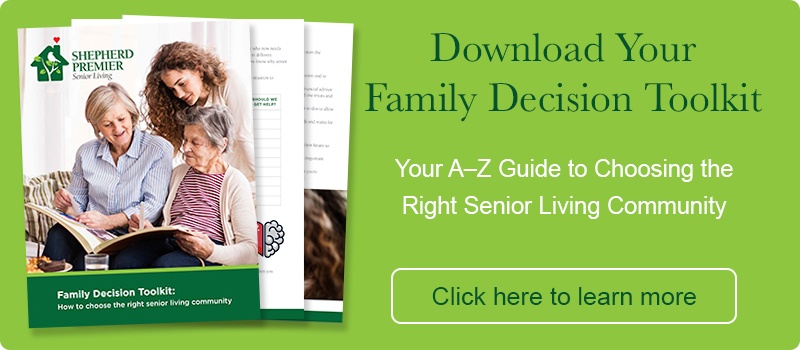In considering assisted living for a loved one, often one of the biggest worries for families is how they will pay for it. Most don’t even know where to start, and realistically, most haven’t saved enough. But that’s OK. We can help you get financially prepared.
Get It Together
By that we mean your loved one’s financial documents like the bank, brokerage and mortgage account information, deeds, insurance policies, monthly and/or outstanding bills, pension statements and/or social security statements plus any stock and bond certificates. Once you have this together you may realize that you have more resources at your disposal to pay for assisted living than you thought. Specifically, consider:
- Your loved one’s home – Determine the market value then consider whether it might make sense to sell or perhaps even rent it for income.
- Savings – What savings do they have? What about investments that could be put toward assisted living?
- Income – Is there a pension? What do/will they receive from Social Security?
- Taxes – Are there any potential tax deductions in which they could benefit?
Keep in mind you certainly don’t have to figure this all out on your own, consulting a financial advisor and/or estate planning attorney can be a big help in maximizing your loved one’s resources to help pay for assisted living.
Avoid Common Misperceptions About Assisted Living
You may think that Medicare, Medicaid and/or your loved one’s health insurance will pay for most of their assisted living costs. While you’re in good company as most people assume the same thing, that’s not really the case. Here’s what they do pay for:
- Medicare only pays if your loved one requires skilled services or rehabilitative care:
- In a nursing home for a maximum of 100 days, but keep in mind the average Medicare covered stay is much shorter (22 days).
- At home, if they are also receiving skilled home health or other skilled in-home services but again these services are generally provided only for a short period of time.
Importantly, Medicare does not pay for non-skilled assistance with Activities of Daily Living (ADL) such as bathing, dressing, mobility and continence, which make up the majority of assisted living services.
- Medicaid does pay for the largest share, but to qualify, your loved one’s income must be below a certain level and must meet minimum state eligibility requirements based on the amount of assistance needed with ADL.
- Health insurance through your loved one’s employer or private health insurance typically covers only the same kinds of limited services as Medicare. If they do cover anything, it is typically only for skilled, short-term, medically necessary care.
Learn What CAN Help You Pay for Assisted Living
Fortunately, there are some options that you may not be aware of that can help offset some of your loved one’s assisted living costs. They include:
- Veterans Aid & Attendance -This is a benefit in which wartime veterans or a surviving spouse may be eligible to receive a non-service-connected pension (above the basic pension) to assist in paying for assisted living, home health care, adult daycare or skilled nursing if your loved one meets certain medical and financial conditions.
- Long-term care (LTC) insurance – LTC insurance can help your loved one pay for the cost of home care, adult daycare, assisted living, memory care, skilled nursing and hospice by covering services typically not covered by health insurance, Medicare or Medicaid. Keep in mind that it’s typically necessary to be in good health to qualify for one of these policies if they don’t have one already.
- Life insurance conversion – You may be able to convert your loved one’s in-force life insurance policy into a pre-funded financial account that disburses a monthly benefit to help pay for needs such as home care, assisted living, skilled nursing and hospice. What’s more, this account is a Medicaid qualified asset, unlike life insurance.
- Reverse mortgage – This is a type of home equity loan for homeowners 62 or older who want to access their equity to supplement income. In this case, the lender would make payments to your loved one based on a percentage of their accumulated equity.
The National Council of Aging also has a free service known as BenefitsCheckUp® that provides a list of benefits in which your loved one may qualify for federal, state and/or private programs based on their criteria. Even if your loved one doesn’t qualify for anything that helps with assisted living costs, they may be able to save in other areas.
You can always talk to us! We’re here to support you throughout your loved one’s journey to assisted living and would be happy to answer any questions you have.
For more information download our Family Decision Toolkit or call (224) 333-6247 to speak to a team member.




